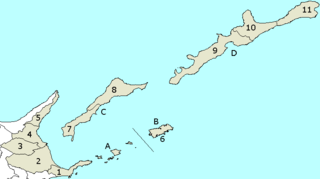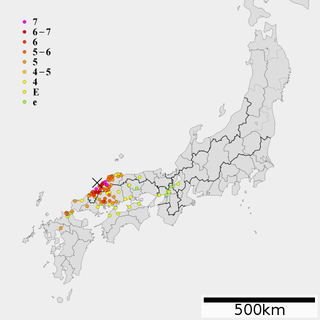Acidman is a Japanese rock group. The band was formed in 1997 with four members, Shiibashi Takeshi, Urayama Ichigo, Satou Masatoshi, and Ohki Nobuo. They created two demo tapes together in 1998, but former vocalist Shiibashi Takeshi left in 1999. Ohki Nobuo took his place and became the leader of the group. They continued playing live concerts, and were eventually signed to Toshiba-EMI. The band is often categorized as punk music or alternative rock but their musical style is broader and is said to blend various kinds of individual styles.
Harmonia is the Greek goddess of harmony and concord.

Aobōzu is a Japanese yōkai (spirit) found in a number of Japanese legends. Stories about aobōzu, in particular the exact details of the spirit, vary widely.
Akiko Shikata is a Japanese singer-songwriter and composer, who is known for writing music for games and anime. She is best known for her contributions to the Ar tonelico, Shadow Hearts and Umineko no Naku Koro ni games, as well as anime adaptations of Umineko no Naku Koro ni, Akatsuki no Yona and Tales of Symphonia.
Lunkhead (ランクヘッド) is a Japanese rock band signed under Victor Entertainment and is managed by Chockyu co. ltd. The band played its first show during their high school graduation ceremony in 1999.

Akiko Yoshida is a Japanese singer and songwriter performing under the stage name Kokia. Her most well known songs are "Arigatō..." and "The Power of Smile" (which topped at No. 8 in the singles chart). She is also recognized for her numerous contributions to anime/game soundtracks, the most notable being "Ai no Melody/Chōwa Oto " for the film Origin: Spirits of the Past, "Follow the Nightingale" for the game Tales of Innocence, "Tatta Hitotsu no Omoi" for the anime Gunslinger Girl: Il Teatrino, "Dance of the Spirits" for the anime “Ancient Magus’ Bride” and "For Little Tail" for the game Tail Concerto.

The Ansei great earthquakes were a series of major earthquakes that struck Japan during the Ansei era (1854–1860):
Fūsoku 40 Metres, is a 1958 color Japanese film directed by Koreyoshi Kurahara and produced by Nikkatsu.

Kamen Rider W, is a 2009–2010 Japanese tokusatsu drama, the eleventh series in the Heisei period run of the Kamen Rider Series and the twentieth overall. It premiered following the finale of Kamen Rider Decade on September 6, 2009, and aired alongside Samurai Sentai Shinkenger in TV Asahi's Super Hero Time programming block. Following Shinkenger's finale, it aired alongside Tensou Sentai Goseiger, until W concluded on August 29, 2010. The series is described as the "Heisei Kamen Rider 10th Anniversary Project: Fall Campaign". In the first episode of Kamen Rider Fourze, W is revealed to be in the same continuity as the original Showa timeline, making it the first series to do so since Kamen Rider Agito. The series is notable for being the first installment in what's popularly viewed as Heisei era Kamen Rider's second phase by fans. A sequel manga series, Fuuto PI, began serialization in August 2017 and an anime adaptation began airing in August 2022.

Trip Trip is Kokia's second album, released in January 2002. It was her first album released with Victor Entertainment, and her only released under Gai Records management. Unlike Songbird, the album was self-produced.

"Ai no Melody/Chōwa Oto " is Kokia's 15th single, released on January 1, 2006, a month before her greatest hits collection Pearl: The Best Collection. The songs were used as the ending and opening theme songs for the animated film Origin: Spirits of the Past. "Chōwa Oto " is a re-recording of her song "Chōwa Oto" from her Gai Records' management era album Trip Trip (2002).
Soyokaze no Shirabe (そよ風の調べ) is the 19th single by Japanese band Dream, released on March 2, 2005. It is the last single released on the Avex Trax label, their third single as a 7-member group, and the last before changing their name to DRM. First pressings of its CD-only edition included one of three stickers. The limited edition came in a special package and included a mini booklet. The promotional video for the first of its double A-sides was included on its CD+DVD edition.
Junko Mabuki is a pink film actress who became famous in Nikkatsu Roman Porno films, particularly in 1981.

The discography of Japanese musician Miho Fukuhara consists of three studio albums, six extended plays, five video albums and numerous singles. Fukuhara debuted as a singer in 2006 locally in Hokkaido, releasing The Roots and Step Up EP through Hokkaido Television Broadcasting's independent label Yumechika Records. After covering Celine Dion's "Because You Loved Me" in 2007, Fukuhara made her major label debut through Sony Music Japan in 2008.

Shana is a village in Shana District, both of which are located in the disputed Northern Territories area of the Kuril Islands. It is currently administered by Russia as part of Yuzhno-Kurilsky District in Sakhalin Oblast, although Japan continues to claim it as part of Hokkaido Prefecture. After the Soviet occupation, Shana became part of the Kurilsky District as Kurilsk. The recorded population was 5,157 in 1989 and 3,634 in 2006.

Typhoon Gilda, known in the Philippines as Typhoon Deling was a destructive, deadly, costly and long-lived tropical cyclone that left over 145 confirmed deaths over Japan and South Korea, mostly due to torrential rainfall that induced landslides, all generated by the typhoon and its associated meiyu front. The eighth named storm and third typhoon of the 1974 Pacific typhoon season, the system was first noted by the China Meteorological Agency as an area of convection embedded on a trough, to the north of Enewetak Atoll on June 25. It was named Gilda on June 30 as it strengthened to a tropical storm. Under a favorable environment, it strengthened to a typhoon two days later as it moved northwestward. Another trough pulled Gilda poleward while changing less in intensity, until it intensified to a Category 2 typhoon as it battered the Ryukyu Islands at its peak. Increasing wind shear gradually weakened the system; however, it remained as a minimal typhoon until it passed through the southern tip of South Korea on July 6, where it weakened to a tropical storm. Colder waters in the Sea of Japan and high shear further degraded Gilda, until it transitioned to an extratropical low as it made landfall near Hokkaido on July 9. The remnants of the system briefly intensified near the Kuril Islands before weakening and dissipating on July 17 over the Sea of Okhotsk.

1872 Hamada earthquake was an earthquake that occurred on March 14, 1872 off the coast of Hamada, Shimane Prefecture in Japan. This quake occurred at 16:40 local time.

Jakoman and Tetsu, also known as One-Eyed Captain and Tetsu is a 1964 Japanese film directed by Kinji Fukasaku based on an earlier screenplay by Akira Kurosawa and Senkichi Taniguchi that was based on the novel Nishin gyogyo by Keizo Kajino. The screenplay had previously been filmed by director Senkichi Taniguchi in 1949.

The Gunma dialect is a Japanese dialect spoken in Gunma Prefecture.












